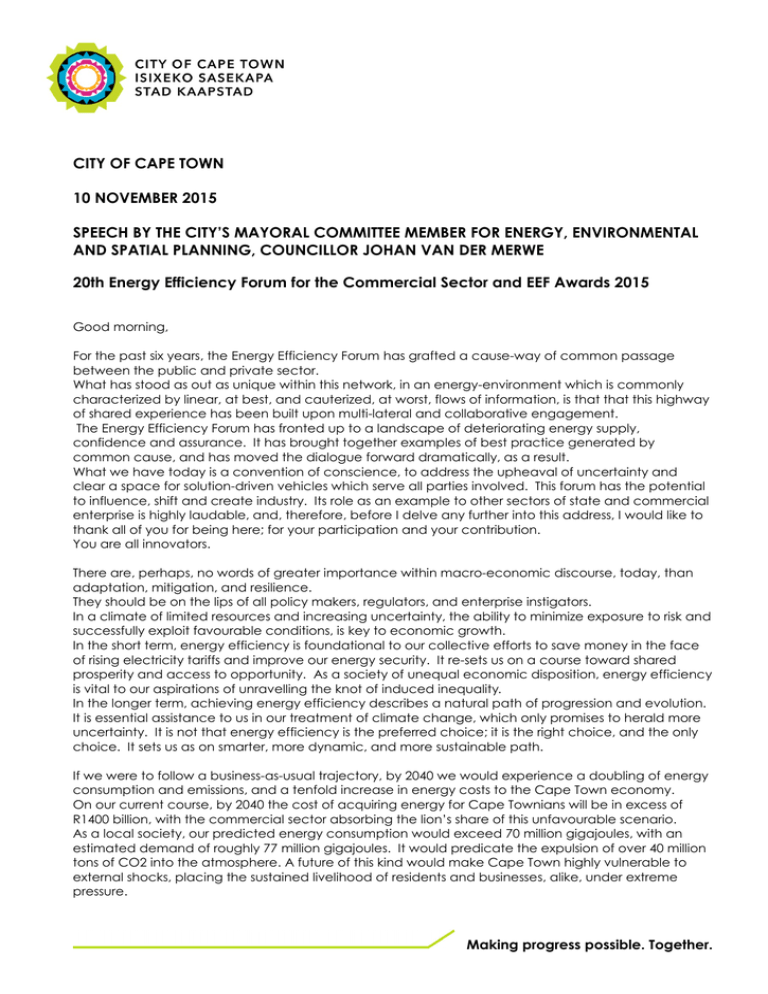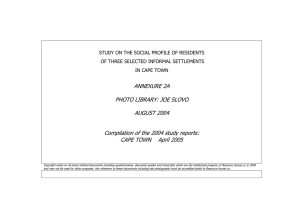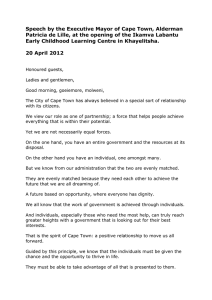CITY OF CAPE TOWN 10 NOVEMBER 2015
advertisement

CITY OF CAPE TOWN 10 NOVEMBER 2015 SPEECH BY THE CITY’S MAYORAL COMMITTEE MEMBER FOR ENERGY, ENVIRONMENTAL AND SPATIAL PLANNING, COUNCILLOR JOHAN VAN DER MERWE 20th Energy Efficiency Forum for the Commercial Sector and EEF Awards 2015 Good morning, For the past six years, the Energy Efficiency Forum has grafted a cause-way of common passage between the public and private sector. What has stood as out as unique within this network, in an energy-environment which is commonly characterized by linear, at best, and cauterized, at worst, flows of information, is that that this highway of shared experience has been built upon multi-lateral and collaborative engagement. The Energy Efficiency Forum has fronted up to a landscape of deteriorating energy supply, confidence and assurance. It has brought together examples of best practice generated by common cause, and has moved the dialogue forward dramatically, as a result. What we have today is a convention of conscience, to address the upheaval of uncertainty and clear a space for solution-driven vehicles which serve all parties involved. This forum has the potential to influence, shift and create industry. Its role as an example to other sectors of state and commercial enterprise is highly laudable, and, therefore, before I delve any further into this address, I would like to thank all of you for being here; for your participation and your contribution. You are all innovators. There are, perhaps, no words of greater importance within macro-economic discourse, today, than adaptation, mitigation, and resilience. They should be on the lips of all policy makers, regulators, and enterprise instigators. In a climate of limited resources and increasing uncertainty, the ability to minimize exposure to risk and successfully exploit favourable conditions, is key to economic growth. In the short term, energy efficiency is foundational to our collective efforts to save money in the face of rising electricity tariffs and improve our energy security. It re-sets us on a course toward shared prosperity and access to opportunity. As a society of unequal economic disposition, energy efficiency is vital to our aspirations of unravelling the knot of induced inequality. In the longer term, achieving energy efficiency describes a natural path of progression and evolution. It is essential assistance to us in our treatment of climate change, which only promises to herald more uncertainty. It is not that energy efficiency is the preferred choice; it is the right choice, and the only choice. It sets us as on smarter, more dynamic, and more sustainable path. If we were to follow a business-as-usual trajectory, by 2040 we would experience a doubling of energy consumption and emissions, and a tenfold increase in energy costs to the Cape Town economy. On our current course, by 2040 the cost of acquiring energy for Cape Townians will be in excess of R1400 billion, with the commercial sector absorbing the lion’s share of this unfavourable scenario. As a local society, our predicted energy consumption would exceed 70 million gigajoules, with an estimated demand of roughly 77 million gigajoules. It would predicate the expulsion of over 40 million tons of CO2 into the atmosphere. A future of this kind would make Cape Town highly vulnerable to external shocks, placing the sustained livelihood of residents and businesses, alike, under extreme pressure. Making progress possible. Together. 2 City economies are enormously energy dependent. The rate of urbanisation is climbing, placing greater pressure on local economies to absorb population growth and social progression. Worldwide, a strong commitment is being called for to identify and enact innovative responses to energy futures in order to facilitate sustained growth and opportunity. As a City, we have identified an optimum energy future; one which exercises fundamental energy efficiency, one which stands to ensure a 15.7% decrease in our energy demand, lowering our combined output to 65 million gigajoules. At our previous Council meeting, at the end of October, the City of Cape Town approved the Energy 2040 Goals and its associated carbon emissions targets. It is a forecasting modelled on creating a more resilient, resource-efficient, equitable Cape Town. The targets for 2040 comprise of • • • • • • A 37% reduction in carbon emissions with 21% from energy efficiency alone less dependency on coal, with extensive embedded renewable generation in the commercial and residential sectors as well as diversified large-scale energy supply with photovoltaics, wind, storage and possibly natural gas the installation of 525 000 solar water heaters and heat pumps by local residents a modal shift from private to public transport with increased access to public transport and motorised passenger-travel in efficient vehicles with higher occupancy levels a remodelled city with increased densification and mixed use in areas of economic activity and increased energy savings from efficiency and cheaper energy Incidentally, these targets form part of the City’s commitment to the Compact of Mayor’s, which is a global drive to rationalise carbon emissions tracking, reporting, and reduction. Our Mayor, Patricia De Lille, will announce the City’s targets to the world at COP21 taking place in Paris over November and December. In doing so, Cape Town will become one of very first cities to achieve compact compliance. Amidst the uncertainty that local business may face in the current climate, it is the City’s desire to be a bedrock of consistency. We wish to implement frameworks that make doing business easier, smarter, and more efficient. The dynamic goals which we aim to drive on a local government level form part of a vision where commercial enterprise is afforded the flexibility and scope to thrive. We recognise that we cannot implement this vision on our own. We are indebted to the contributions made by forums such as this one, which promote cooperation and information sharing, rather than linear agenda setting. Whilst I extend my deep gratitude to you all and the role that you play in making a progressive future a current day ideal, I would also like to thank our partner organisations; ESKOM and SAPOA for their long standing partnership in the Energy Efficiency Forum. Similarly, a word of thanks to Old Mutual for the continued use of this great venue and past support is highly appropriate. Finally, I say thank you to the team of energy M&V experts from UCT’s Energy Research Centre who have made up the judging panel for this year’s awards. Therefore, with further ado, it gives me great pleasure to announce the recipients of this year’s Energy Efficiency Awards. The Winner of the Small Building Retrofit Category is: The Cape Town French School, and Energy Intelligence who undertook the retrofitting work The Winner of the Large Building Retrofit Category is: The Bayside Mall, owned by Growthpoint Properties Limited





